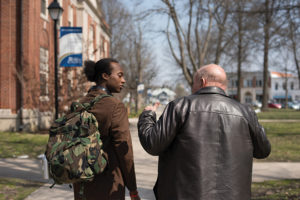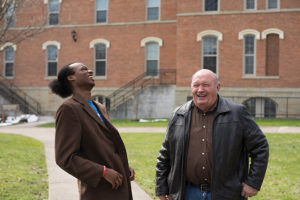Tom Hutchens ’67 (left) and Sunny Bland ’21 discuss their experience as first-generation students at Berea. Tom grew up on a farm in the Appalachian region of Virginia. Sunny is from Memphis, Tenn.
(Photo: Moriah Avery ’21)
Tom Hutchens ’67 and Hasani “Sunny” Bland ’21 would seem to come from different worlds. Tom grew up on a farm in the Appalachian region of Virginia. Sunny is from a rougher part of Memphis, Tenn., and wants to be an author, poet and playwright. Tom, after a career in the tobacco industry, now is involved in Kentucky’s growing hemp industry. But they’re both Bereans, and both are the first in their families to attend college—an achievement they once felt was not a possibility. We brought them together to find the commonalities that transcend geography, demographics and time.
A limited future
Tom: I came from a small community in Patrick County, Va., grew up on a dairy and tobacco farm. My family worked hard. I didn’t really have great aspirations. I was interested in agriculture and asked about Virginia Tech. The tuition was more than we could afford, so I was just going to farm with my dad.
Sunny: My childhood was super busy, complex streets and kind of an unfriendly vibe. I didn’t have a lot of friends. It was a dangerous area. My parents hadn’t gone to college and didn’t know how to prepare me, so I focused on making A’s. But there wasn’t anywhere I wanted to go to college that would not plague me with incredible amounts of debt. So I stayed home and picked up work in a warehouse.
Advocates
Tom: One day, my agriculture teacher asked me where I was going to school. I said was going to farm with my dad because I couldn’t afford school. He recommended Berea and offered to get me an application. At first, I was rejected. Berea said my dad made too much money. My teacher asked what I put down, and I told him. He said, “Son, they meant net income, not gross!” So, he called to clear that up. And he spoke to Coach C.H. Wyatt to tell him he had a baseball player and asked him to go over to the Admissions office and tell them the young man screwed up his application.
I don’t know why my teacher asked me why I wasn’t going to college. It must have been something. I thanked him personally. He brought me into a bigger world, and I’ve been enriched for that.

Sunny: My friend Charlie (Boyd ’19) is a Berea student. We would have these philosophical conversations. Every year, he showed more growth and enlightenment and was returning with more insights, references and sources. I was enjoying our conversations more and more, but I was kind of jealous. I was buying books and soul searching for the information he already had. I was like, where are you getting this understanding and knowledge?
He said he had a lot of help and asked why I didn’t come to Berea, too. I told him I was broke. He said, “That’s the great thing about this place. They don’t charge tuition.” I said, “I’ve been lied to a lot in my life, but that one almost took it. That place doesn’t exist.” He insisted it wasn’t a scam. So I called. It was real. I had a chance to go to college!
Charlie advocated for me with admissions. I got in. I finally made it. I was going to get a degree. I no longer had to worry about how to educate myself without going thousands of dollars into debt. It was this feeling of joy and elation. Charlie and I were both so happy. Berea has given me a chance I wouldn’t have had before.
On being a first-generation college student
Sunny: Before me, there wasn’t a college degree. My dad tried and didn’t get it. My mom is trying now, but I started before she did. I have five sisters. After I got into college, there was a spark in the family. We had more pride, a feeling like we all can do it. They tried harder, and I pushed them harder. Our parents believed more, and they started pushing harder. And it worked out. One sister is going to Middle Tennessee State University. Another is going to Sewanee University. It’s like I helped lead a change where we can be prouder of ourselves, and we all can improve the family.
Tom: I had a similar experience in that I was the first in my family to go to college. I have four sisters. Three of them are college graduates. They’re all good, productive citizens. We set an example for the whole community. I feel good about that. Getting a college degree is quite a milestone. It’s pretty neat to not be back home working on the farm. There’s nothing wrong with working on the farm, but I like myself being where I am today.
Their Berea experience
Sunny: I’ve never questioned myself or society as much as I have here. Because of Berea, I’ve learned to question and to ask what makes a person better. It’s led me to a lot of answers and new questions that have bettered my life. Without Berea, I feel I would have become very stagnant. Berea is important because it gives people with a thirst to learn more of a chance to follow their dreams and, in turn, impacts society by bringing more people in who can invent and do more. Berea wants to challenge you. All of my teachers ask the question, “so, what?” Berea does that to your life.
Tom: Berea cracked my small bubble. I knew nothing but 30 miles from home. Berea transformed me. This place here opened the door wider, brought me opportunities. I’m a much broader thinker. I enjoy going to museums. I enjoy music differently than I did. I wouldn’t take anything for my liberal arts education. And Berea is important also because of the hands-on work experience that enables use of talents and skills and the way it magnified the information in the classes I took. It’s also important for helping the underprivileged like myself and Sunny, who wouldn’t have gotten an education otherwise.
Though different in a lot of ways, Tom and Sunny’s experience of being the first in their families to go to college matches the majority of the Berea College student body. Nearly two-thirds of Berea students hold this family honor. They also found common ground in family dynamics and the effects of a broad education on a person’s worldview, and these human commonalities reiterate the Berea ethos that people are made of one blood, that we are more alike than we are different. Their discussion was much broader than represented here, ranging from economic theory to campus social life, then and now. In the end, Tom left Sunny with some friendly advice: choose human interaction over digital relationships, and find your “little wrinkle,” a societal niche only Sunny can fill.

(Photo: Moriah Avery ’21)


